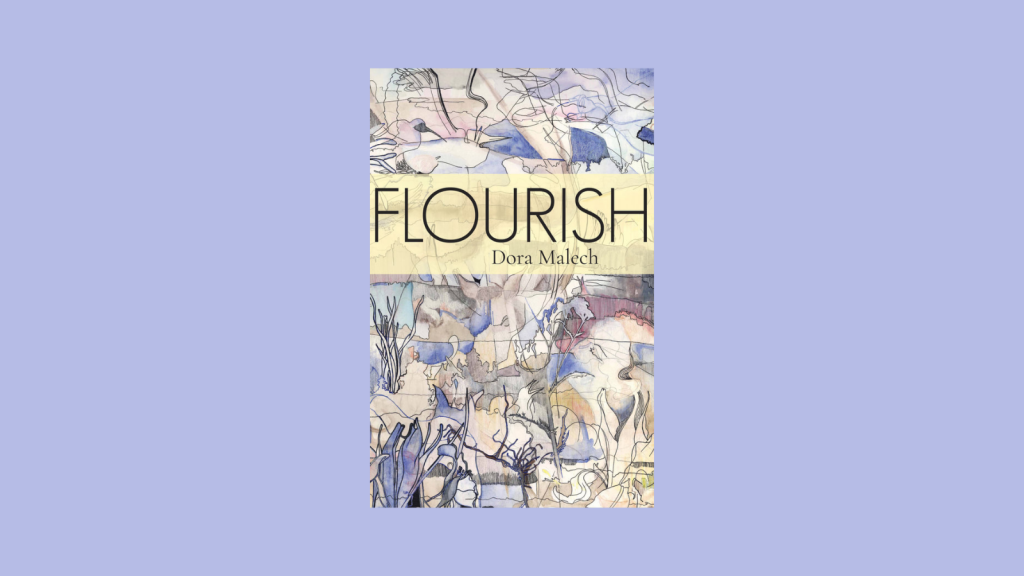At the 2019 Princeton Poetry Festival, poet and professor Dora Malech gave a reading of two short poems. The first, “Four Weeks,” was about the early stages of a pregnancy, and the second, “History,” was about a miscarriage. Before reading the second poem, Malech said that the miscarriage “loomed large for me, personally, but incredibly small in any bigger picture.” She told the audience, “I wanted to explore that tension.”
Malech’s voice, as she reads “History,” is careful and steady; it’s as though she’s measuring how much she wants to tell us. “I won’t say,” she lingers here, “what I named it, but I named it, out loud.” After revealing that the child died, she addresses us directly, “Don’t look at me with pity,” and uses her experience to remind us of our own. “You know you’ve known its name, and how it feels to hold inside you, and believe it to be good and growing (…).”
This poem demands to be read one way; it’s not “open to interpretation.” And yet, the poem is not uncomplicated or tiresome. Instead, the speaker startles us by intending to mean what she set out to mean, by refusing to be misunderstood, and by refusing to explain herself at all. She is not the only one to have experienced loss, she is not weaker for it, and, if we remember, we know loss—whether of a child, a love, or a plan—too.
There are many pleasures to be found in reading Dora Malech’s fourth book, Flourish. Across the book, and across the many different types of poems within it, Malech uses her expert sense of metaphor, timing, and relationships among words to strike a sort of wry, sideways-glancing balance between celebrating happiness and recognizing pain.
“Flourish,” the word that serves as the book’s title, is a verb that means to do really well and conjures in my mind images of couples walking laughingly along a river or wooden tables spread with meat and fruit. It’s also a noun, something added on just for fun, because it looks good. A frustrated reader, as one might sometimes be forgiven for becoming, perhaps as they read a poem like “Peter Piper Speaks and Spells,” might sometimes feel that Malech takes this particular definition of the word too far. But, coming back to the book in a more patient mood, the same reader will understand that another definition of “flourish” could be the sense of fitness or appropriateness we feel when our ability to do something, and our desire to do that same thing, align.
“Flourish” is also the title of the book’s joyous last poem. By looking at vines like wisteria and clematis, or by imagining them, or by repeating the words to herself, the poet closes the book with another definition: “thriving/not only as noun and verb, but stem, climbing/aster…” By this, I understand that she’s referring to a kind of present imperfect, an ongoing flourishing that happens even when you’re just getting along. The poem makes me want to look around and call out, “Look, Mom!” and, “Mom, we’re doing it!”
“Lake Roland Park” is a prose poem about a park in Baltimore, where Malech lives and works, and it’s about naming things. The poem is light and descriptive, seeming to follow the speaker’s attention as it drifts. She’s in a park. There are lilacs, about which she quips, “Fancy all these flowers opening to mouth their truest names,” a train, and a moment of setting this public park in a local and national context.
In 2015, in Baltimore, Freddie Gray died in police custody. As a consequence, the city erupted in what, the speaker tells us, “the city calls, alternately, the riots, the unrest, the uprising.” A year later, as the speaker makes these observations, the park’s name, Robert E. Lee, is changed to Lake Roland Park. Her attention turns to the people around her: walkers and runners, all with headphones in. What are they listening to, and what do they make of it?
“Imagine hooks and basslines, melodies unheard except for self-selecting audiences of one by one.” Malech can’t tell us how to understand the events in Baltimore during the spring of 2015–at least, not in the same way that she could tell us how to understand the events of her own life in her poem “History.” Instead, she calls attention to the fact that calling something by one specific name, rather than another, is a decision—even if it goes unrecognized.
“I Now Pronounce You,” which comes a few pages after “Lake Roland Park,” describes a road trip that starts in the poet’s kitchen, as she considers a wedding invitation held onto her fridge by a magnet that’s almost up to the task, “so by the time/summer arrived in earnest the betrothed/names were shimmering askew on level/with my shins and the vegetable crisper.”
Throughout the poem, Malech makes us laugh, reporting back to us the little things that are surprising and funny as the speaker and her boyfriend travel to a friend’s wedding. She’s sensitive to the question of her future but acknowledges this concern only with an understated attention to what is able to survive. The couple camps, they eat fast food, they collect pamphlets, and read historical markers. The poem’s tone is placid, the speaker remembering lessons from childhood: the climate of Mars, the alphabet, how sound travels.
In one of my favorite examples of the way that Malech balances wit and wisdom, the couple unfurls the boyfriend’s tent to find a note from a former girlfriend (they’d had drinks with her and her husband the night before) that reads, “I love you,” inside.
I loved her for writing it, I loved him for saving it, I loved the tent for sheltering it and us, and I hate myself for that other kind of dwelling (on) in which nothing can live.
Near the end of the poem, the couple has made it to the city where their friends are getting married and are sightseeing. They read a plaque about a historic bell:
The oldest bell in Ohara, it had been destined for wartime scrap, meant to melt, but spared. For what reason was it never destroyed? “For some reason it was never destroyed,” the sign explains.
At the end of the poem, someone rings the bell, but we don’t know who; in a line that reads like Robert Frost’s “Directive,” the speaker switches into the imperative. “Pull back the beam and ring the bell.” When two nearby children look up to see where the sound came from, the speaker remembers that sound is movement. Because she is very close to the bell, she can also hear the sound of rusty chains moving, which she describes as “a footnote in a smaller font,” and is, if only metaphorically, also moved.
“For Eleza” begins with excess and gratitude. The speaker’s friend has sent her home, after a visit, with a gift of succulents. The plants thrive in their new home, and the speaker says, “I have tried to let this growth/exist a welcome fact.” In the next stanza, she says something similar about a memory of her friend, which begins, “I have watched you dive/through waves…”
and even this image of your actual figure need not stand as figure either just exist in fact of memory (…)
In the third stanza, the speaker recalls another memory,
I have smoothed plaster onto your pregnant belly and watched as it set to hold your shape the week before your first daughter entered the world through you.
The repetition of “I have” seems at once to insist that the speaker knows the person she’s addressing, and to confirm that these things actually happened. We learn in the middle of the third stanza, toward the end of the poem, why the speaker is doing this: her friend’s mother and husband are gone.
As in “I Now Pronounce You,” “For Eleza,” ends by turning the speaker’s attention to the physical reality of being alive. The poet abandons the anaphora for a new construction, “In the past’s present,” by which she means what has happened is also happening now. I have seen and I am seeing. You have made, and “you are making a mobile/of driftwood.”
Focusing on this object, the speaker moves into the future, to a time when her friend’s children will be grown and out of the house, and when the mobile will still catch sunlight and cast shadows, making, the poet writes, “sense/of a relationship with light.”
In “For Eleza,” the speaker is directly addressing her friend in an effort to connect with her after a devastating loss; in “History,” the speaker directly addresses us, strangers, to teach us the appropriate way to react to her suffering. In “Lake Roland Park” and in “I Now Pronounce You,” we see the same speaker take a more suggestive than argumentative position. These poems are also in first person, but the speaker seems to observe passing thoughts rather than speaking as someone aware of being listened to.
The tone in “Uprising,” a third-person, sonnet-like manifesto about a suicide, is difficult to describe because there is no feeling, until the end of the poem, of the speaker having a perspective, or even of a speaker at all. The speaker is a camera, or maybe a notary, or a coroner. This poem feels powerfully unlike the other poems in Flourish.
The poem opens by describing the body of an unnamed person who has died by suicide. To us, he is distinguishable only by the fact of what has just happened. However, there are people who knew this person, and the poem does imagine them receiving the news, but only after noting: “It was useless to try to keep track/of them all.”
The second stanza, which is nearly the mirror of the first (the first has nine lines, the second ten), begins with another description of the body and then compares it to the bodies of a couple sleeping together,
If two lie together, the air between still holds a charge, but only the air. Their bodies are done in, pressed against the mattress as if to the stained stones.
How do we write about happiness? And how do we write about suffering? The last three lines of “Uprising” give us a model. When looking at a tragedy, the first thing we can do is affirm that it is true, “The dead man alone lies out in the light.” From there, we recognize a person’s fundamental right to describe the circumstances of their life:
The dead man alone lies out in the light. It’s his right not to admire the sky. It’s his right to look down on its dark uniform adorned with all those glittering revolutions.
Beauty and partnership exist; so do solitude and suffering. It is useless and, besides that, cruel to argue with someone about their own experience. The metaphorical language in the last few lines of “Uprising” and the title itself remind us that, just as matters of justice play out in one’s personal life, broader struggles for justice are never irrelevant to our own lives.
The poems in Flourish encourage us, instead of asking “What can I do?” or “How can I help?” to ask, “What have I experienced that can help me understand this?” The book serves as a reminder that we already are, even if we’re not accustomed to thinking about ourselves in this way, part of the big picture.




